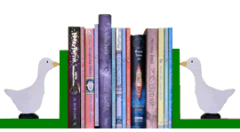An author website is an essential part of your marketing campaign. It makes it easy for readers and reviewers to find you online and gives you somewhere to send people for information about you and your books. So how can you make your site as effective as possible without spending a fortune.
Back to Basics
A website is just a big chunk of computer code. When someone wants to see your website, their computer uses your web address to contact a computer (called a server) that holds your code. It then downloads that code and uses it to create what your site visitor sees on their screen. So, in order to create your site, you need to do three things:
- organise a domain name
- organise your site to be hosted on a server that’s connected to the internet
- create the actual site (the code)
Creating the site
Even if you pay someone to get you started, it’s good to be able to update your site yourself. The simplest way to do that is to create the site with WordPress or an equivalent system like Joomla. Although these systems use templates, you or your web designer can adapt the appearance to make your site look the way you want.
Hosting your site
The cheapest option is to have your wordpress site on wordpress.com. Basic hosting is free, but they may put ads on your site and you can’t use your own domain name without paying extra. There are also restrictions on which templates you can use and what you can do with your site.
The alternative is to pay for hosting and I believe that’s the better option. It’s not expensive and gives you more freedom as to how you use your site. It also makes it easy to use your domain name as your email address, which looks very professional.
Before you sign up with a hosting company, look carefully at these issues.
- Do they offer the system you want? (WordPress, Joomla, etc)
- What support do they offer. Can you talk to them on the phone or is all support by email?
- Do they backup your site? (It’s great if they do but it’s not essential, provided you back up your site yourself.)
- How much do they charge? Although most companies offer a variety of packages, you’ll probably find the basic one is good enough or maybe the next one up. You won’t need a top-notch package.
- How long are you committed for? Can you change your mind easily if you’re not happy with what they provide.
- What’s their reputation like? Put their name into a search engine and see what people have been saying about them recently.
Choosing a domain name
Domain names are not expensive so it makes sense to have your own. It also looks professional, especially if you use it as your email address too. You won’t actually own the domain outright. You register it in your name for a period of time at the end of which you have to renew it or lose it.
Your writing name is usually the best choice, but you may need to think creatively if that’s already been registered. So if yourname.com or yourname.co.uk isn’t available, you could try yournameauthor.co.uk. yournamewriter.com or yournamebooks.com. If you write on a specific topic and want the site to be more about the topic than about you as an author, you may prefer to use a domain name that reflects that topic.
.co.uk domains are cheaper than ones ending in .com and show you are UK based. If you’re not sure which to choose, you can register both and point them both at the same site so it doesn’t matter which one people type. (I’ve done this with my own author site.)
Other situations when you may want extra domains pointing to your site include:
- If your name is particularly hard to spell so you want to register the most common mis-spelling(s).
- If you want to register the domains for the titles of your books. You can point these at the relevant pages in your site.
- If you have created an imprint for your self-publishing. If you register the imprint’s name as a domain name, you can point it at your site. I believe t’s only worth having a separate site for the imprint if you publish other people too.
- If your main domain name reflects your non-fiction topic, you may want another one based on your name that points to the same site.
Having got to grips with the basics, the next step is to plan your site.
Diana Kimpton
If you found this article helpful, you may enjoy these other articles about author websites:
- Planning your author website
- 10 mistakes to avoid on your author website
- Search engine optimisation – is it worth paying for?
- How to build traffic to your author website
